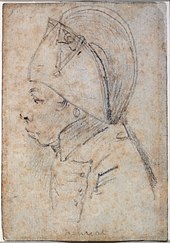François Hanriot
François Hanriot (also Henriot; born September 3, 1759 in Nanterre , † July 28, 1794 in Paris ) was a French revolutionary .
Life
Hanriot, whose parents were servants, served a lawyer (advocate) for a time until he was dismissed for theft. He then worked as a tax officer. He was also dismissed there in July 1789, after leaving his post when revolutionary Parisians tried to burn down his office building. He then lived in poverty and got by with changing activities until he became a speaker of a sans-culottes association . His advocacy of the violent taxation of the aristocracy made him popular with the sans-culottes and he was one of their leaders in the September massacres in the prisons in 1792. He then became a member of the National Guard , where he was promoted to captain.
When tensions arose in the spring of 1793 between the Girondists and the radical mountain party around Maximilien Robespierre and radical sections of the Paris municipal council, which came to a head after the radical publicist Jean-Paul Marat was arrested, the Paris municipal council appointed him on May 30th to the commander of the National Guard. With this he surrounded the National Convention , forced the dissolution of the Girondist-dominated Twelve Commission, which had executive power, and the extradition of 22 selected Girondins. That was the beginning of the reign of terror . Robespierre became the chairman of the new Public Safety Committee ( Welfare Committee ). Hanriot became permanent in command of the National Guard and was a loyal follower of Robespierre. Even when Robespierre turned against the supporters of Jacques-René Hébert and the sans-culottes, Hanriot was on Robespierre's side despite his sympathy for them.
When a counter-movement against Robespierre's reign of terror formed in the National Convention in July 1794, as many there now saw themselves threatened, and Robespierre was arrested on July 27 ( 9th Thermidor ) in the Convention, Hanriot supported Robespierre with the Paris Commune took military steps to liberate it and to take action against the National Convention. He ordered that no Paris prison should accept Robespierre and his supporters and rode with armed police to the Tuileries to rescue Robespierre. Instead, he was captured himself and had to be freed by Coffinhal . In the meantime his opponents tried to place Robespierre in a prison, but were turned away everywhere and he was released with his supporters. Robespierre and his supporters, including Hanriot, gathered in the town hall, but were surrounded and captured by troops from the convent that night. Hanriot fell out of a window and was initially able to hide, seriously injured, but was arrested soon afterwards. He was guillotined with Robespierre and his other supporters on July 28th.
literature
- Hanriot, François . In: Encyclopædia Britannica . 11th edition. tape 12 : Gichtel - harmonium . London 1910, p. 927 (English, full text [ Wikisource ]).
| personal data | |
|---|---|
| SURNAME | Hanriot, François |
| BRIEF DESCRIPTION | French revolutionary |
| DATE OF BIRTH | September 3, 1759 |
| PLACE OF BIRTH | Nanterre |
| DATE OF DEATH | July 28, 1794 |
| Place of death | Paris |
